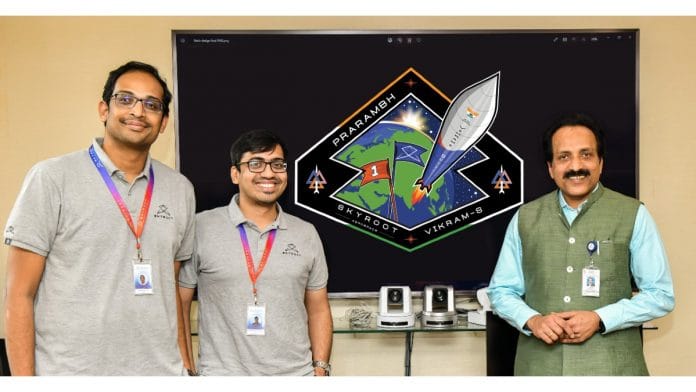Bengaluru: In an exciting end of the year for private spaceflight in India, two major announcements were made a couple of hours apart on Tuesday: Skyroot Aerospace will launch India’s very first private rocket this month, while AgniKul Cosmos successfully tested their 3D-printed rocket engine.
Skyroot’s mission, called Prarambh, will launch between November 12 and 16. The rocket will perform a suborbital flight with three customer payloads, and will test and validate the rocket’s technology. It will be launched from ISRO’s Sriharikota, from where all of ISRO’s orbital launches occur. The final date will be announced closer to launch depending on weather conditions.
With this mission, Skyroot Aerospace will become the first private space company in India to launch a rocket. The rocket that would be launched belongs to the company’s Vikram series of rockets, named after space visionary and founder of the Indian space programme, Vikram Sarabhai.
CEO and co-founder Pawan Kumar Chandana told ThePrint he was feeling “elated and yet nervous” with just a week to go for the launch. “It took more than four years to get here with the phenomenal team’s work at Skyroot,” he added.
In a press release, COO and co-founder Naga Bharath Daka said that the rocket, a Vikram-S class, is a single-stage sub-orbital launch vehicle, and that the flight will test and validate a majority of the technologies in the Vikram series.
The Hyderabad-based company works with a mission to “open space for all” and belonged to the first group of startups to sign MoUs with ISRO for access to facilities and expertise.
Meanwhile, AgniKul’s engine, called Agnilet, was tested through Vikram Sarabhai Space Centre (VSSC), ISRO’s centre for development of launch vehicles, and is expected to make a test flight by the end of this year.
The testing was done for 15 seconds on November 4, at the Vertical Test Facility, Thumba Equatorial Rocket Launching Station (TERLS), Thiruvananthapuram.
The patented engine is fully 3D printed and is a second stage semi-cryogenic engine designed to be used in the company’s fully 3D printed Agnibaan rocket that is currently being developed. The rocket will use another patented engine called Agnite (yet to be tested) in its first stage.
The Agnibaan rocket, which translates to arrow of fire, will be launched by a mobile pedestal called Dhanush, which translates to bow. The rocket will be tested in collaboration with Alaska Aerospace.
The Chennai-based, IIT-Madras incubated startup is gearing to launch the vehicle by the end of the year, CEO and co-founder Srinath Ravichandran told ThePrint.
“This engine is much closer to the engine that will be in the first flight,” he said. “This successful test is a validation of our tech at ISRO’s facilities. Since the engine is quite unique, this is a huge milestone for us.”
Both startups worked with ISRO through the newly constituted IN-SPACe regulating agency, which was formed in 2020 to bring together ISRO and the private industry.
(Edited by V. S. Chandrasekar)
Also Read: More satellites, startups & revenue by 2025: Report sees big growth in Indian space industry






